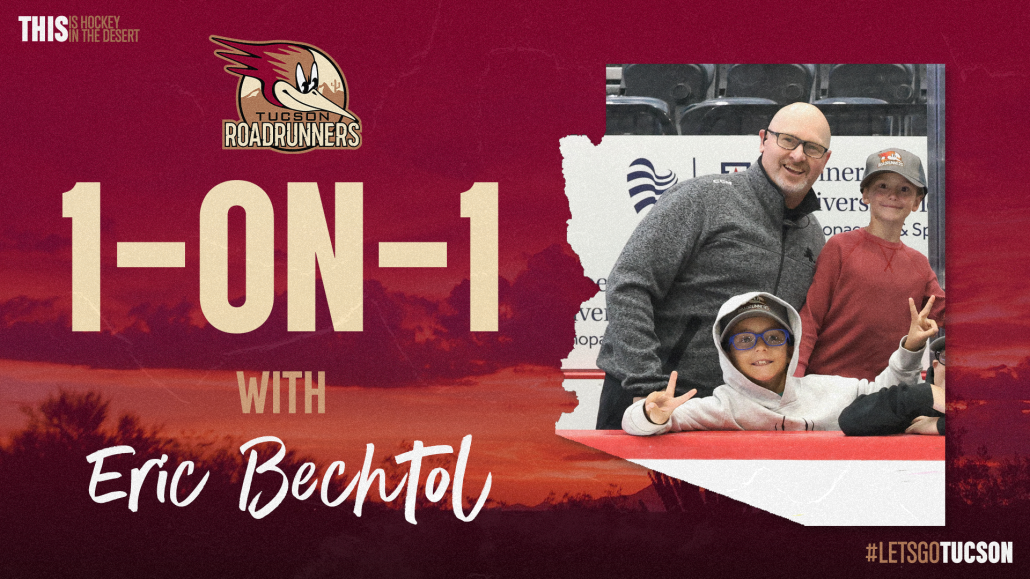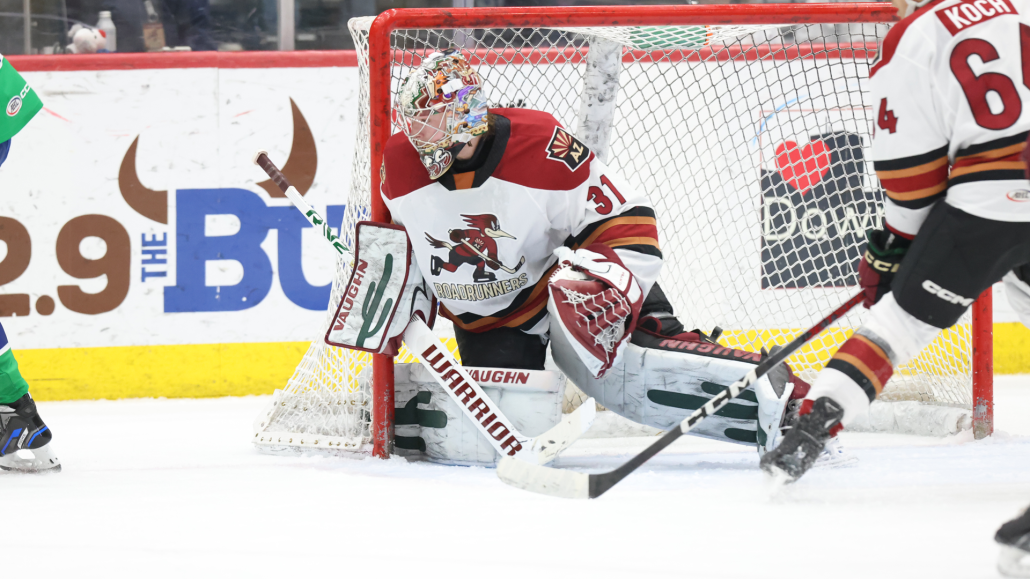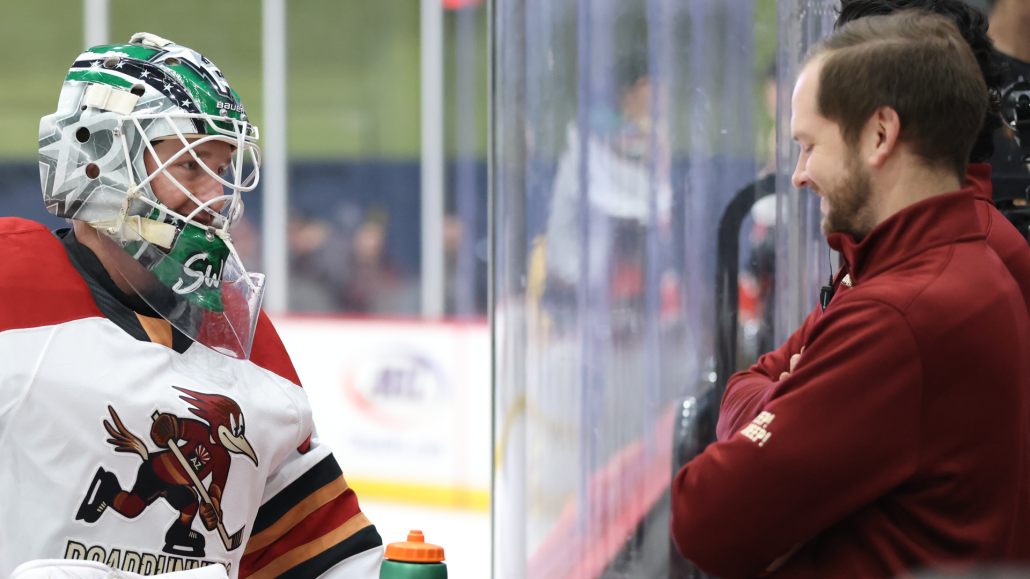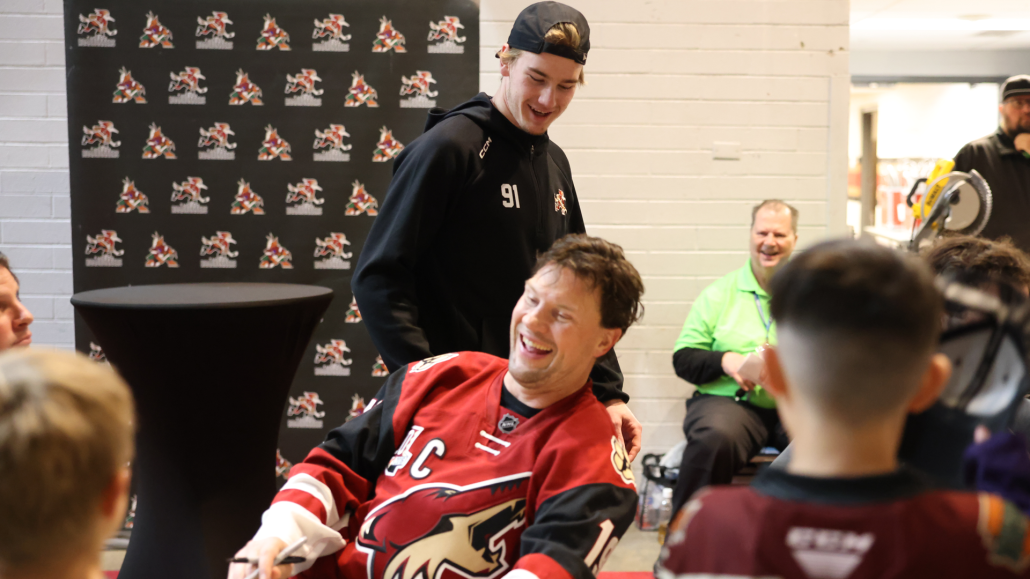1-on-1 With Eric Bechtol
Tucson Roadrunners Head Equipment Equipment Manager Eric Bechtol joined Adrian Denny, Kim Cota-Robles and Arizona Daily Star Sports Editor Brett Fera this week on Roadrunners Happy Hour. Catch Happy Hour every Tuesday at 5 p.m. on Fox Sports 1450 AM and the Roadrunners Happy Hour Podcast on the iHeartRadio app. For the complete episode, and to hear about Adrian’s run in with Eric’s son Caden, download below.
Listen to “The Devil In The Details” on Spreaker.
Q: You have been with the Roadrunners since the first year. How much easier does that make your job as the years go on?
We’ve tuned it in pretty good. We have a pretty good idea of what the other person and maybe the other group, as far as the medical guys or Parker (Parker Moore Performance Coach) what they’re looking for. They are always willing to pitch in and help us with getting equipment around in the inside of the different arenas that we go to, at home, and anywhere else we go. We’re very fortunate that we have a staff where we all get along really well, and we make sure that we’ve always got each other’s back.
Q: How did you get your start in being an Equipment Manager? Did you always know you were going to be an Equipment Manager?
I was just a little guy, I was probably four years old. My dad had worked with a guy, and they were good buddies, and he had a son that was a year older than I was. We would go in and we’d clean up at their workplace, we’d clean in their building on Sunday, we’d get our 50-cent piece. And they asked, “Hey, do you want to come in with me to watch Ricky play hockey tomorrow?” And we’re like, “Sure, okay.” So I went in at four, I watched these guys play hockey and I’ve been hooked on the game ever since. So that’s really where everything kind of took off. I started playing in the program in Kalamazoo and I would always hang out, and in the 70s, it was okay if you left your child behind for a couple of hours at the ice arena, because I definitely did not want to go grocery shopping or anything of that nature. So, they would leave me at the rink for an hour or two. All the guys around, we would play a tape ball hockey or anything that we could find just to be hanging out at the rink. As it was going, the Kalamazoo Wings were there, and at that time it was an IHL team. One of the kids that I played with a lot, his dad was the Equipment Manager, the medical guy, the everything guy for the K-Wings, and at one point he says, “Hey, would you like to help me out a little bit?” And I was like, “Sure, what do you need?” And that was before you had netting or anything behind the glass, he said, “Here’s a bucket, would you go pick up as many pucks as you can find in the stadium?” So, I was like, “Sure.” That went well, next thing you know, he said, “Have you ever folded towels?” So here he shows me how to operate the laundry setup and we’re folding towels, and I was probably 10 or something at the time. I mean, really that was my start and after a couple of years of that, I was the room kid and still playing hockey and having a blast with the game. That’s really how it all took off. Any free time I had, I always seemed like I wanted to be at the rink or whatever, sometimes it was baseball or golf. My family was always big into golf, but hockey was always my first love, and it hooked me as a player. And like I said, I always wanted to know how things work, so I was always willing to tear my equipment apart and try to put it back together. Which didn’t always make my father happy, but that’s really how everything started as far as me falling in love with the game and being lucky enough to be a part of that locker room. Things kind of progressed from there. I worked and by the time I was 15 or so, I was working in the hockey businesses in town and helping with things of that nature. I was going to school, I thought I wanted to be an elementary school PE teacher, and I got a couple of calls in the midst of all of that with opportunities to work in Fort Worth, Texas with the Fort Worth Fire, and things kind of progressed from there.

Q: How do you know who’s going to need what? This past weekend you had to change both of Matty’s blades during the game.
We as equipment managers are always looking for ways to keep guys in the game. So, in the past, a guy would have a bad edge like that, and he would physically have to remove his skate. We’d have to take it away, sharpen it, and bring it back to him. Now we have that system where it’s a trigger system where we can pull a little trigger, or a little dial and I can pull the blade out and replace it with a new one that is ready to go. We, here in Tucson and the Coyotes, use three sets of blades, and we have a set on the bench for every player, so they don’t miss a shift. A lot of times, you guys may not notice it, because you’re watching the game and other things are going on, but it’s a way to eliminate any issues with any of the skates. Sometimes it’s major like Matty’s skate was pretty bad the other night, but sometimes it’s minor. It eliminates from the player’s mind any issues and gets them back on the ice and then we can we can fix them up between periods and just rotate the blades through our little system that we have. Through the blade bag, into their skates, into their kit bag and like I said, we keep them that way it keeps everything kind of the same, I guess we’ll say, plain. The blades are already the same and the players don’t know the difference one way or between one set or the other, most of the time. Those are just the ways that we set things up, and most teams have something similar to a system to that now.
Q: How does it feel when your assistant or one of your guys gets called up to the NHL? Obviously, you have Matty Schwegmann now, but before him you had Ryan Andrus who is now with the Coyotes.
It’s awesome. It’s like the proud dad moment, whether it’s a Ryan Andrus, who gets to go up and work with the Coyotes and fulfilling some of his dreams. Matty is an up and coming equipment guy and does an amazing job, we love having him around. I mean, they’re obviously two different guys and we figure out solutions and ways that work. I was always lucky enough to have a couple, three or four, guys, that were amazing guys, that were the mentors for myself, and I guess I have kind of changed into that role, where I can do that.

Q: How much are you able to actually watch the games on the bench? It seems like so much is going on that you wouldn’t be able to watch at all.
I watch the game, definitely in a different light than what the coaches are looking for. They’re paying attention to positioning, where their guys are at, and what plays they’re trying to work and set up. I’m looking for guys that are like, maybe we’re on the penalty-kill and someone takes a shot from the point and our player puts a stick in the lane and it hits his stick. Then I was like, even the sound and the things like that sometimes you can pick up on to where you go “oh boy, that guy stick’s going to be broken,” so you’re paying attention and you’re watching different things like that. Or a guy falls down somewhere and they’re playing hard in the corner and they’re kicking the puck and then they’ll knock their edge off and you can see that that’s coming. So I’m preempted and ready to go, knowing that they’re going to come off and either ask for a stick or change a skate blade, or maybe there’s something going on with the gear that I notice when someone skates by and something’s torn or that we can get together and repair it. Sometimes it’s a repair on the bench, sometimes it’s between periods but I would probably say that I catch probably at least a good 80-percent, if not more, of what’s going on in-game. When you are standing on the bench and there is a live puck flying around you definitely want to be paying attention. It is not a good situation to get hit with a puck. In 2000 games, almost 2000, games, it definitely has happened. I’ve been hit a couple of times.
Bonus Coverage: a Quick Question With Shane Doan
Listen to “Josh's Dad Is In The House” on Spreaker.
Q: You’ve been at the TCC a lot did you play in any preseason action here for the Coyotes?
Yeah, I think I played one game (in 2017 against Anaheim). We played an exhibition game here which was a lot of fun. Obviously, the State of Arizona is huge for hockey to keep growing, we have to keep it growing. I’m a big fan of the hockey here, we just have to keep it going and keep growing, and I think Tucson has a great opportunity to grow here if they can get some hockey programs going, the way that they’ve started and keep them built.



